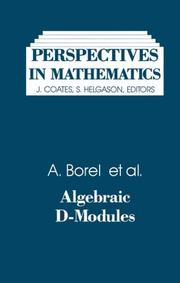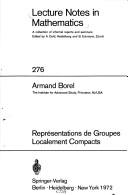| Listing 1 - 10 of 34 | << page >> |
Sort by
|

ISBN: 0121177408 Year: 1987 Publisher: Boston, Mass. Academic Press
Abstract | Keywords | Export | Availability | Bookmark
 Loading...
Loading...Choose an application
- Reference Manager
- EndNote
- RefWorks (Direct export to RefWorks)
Ordered algebraic structures --- 512.55 --- D-modules --- Differentiable manifolds --- Germs (Mathematics) --- Rings (Algebra) --- Sheaf theory --- Cohomology, Sheaf --- Sheaf cohomology --- Sheaves, Theory of --- Sheaves (Algebraic topology) --- Algebraic topology --- Algebraic rings --- Ring theory --- Algebraic fields --- Equivalence classes (Set theory) --- Functions --- Differential manifolds --- Manifolds (Mathematics) --- Modules (Algebra) --- Rings and modules --- 512.55 Rings and modules --- Variétés (mathématiques) --- Équations aux dérivées partielles. --- Differential equations, Partial. --- Variétés (mathématiques) --- Équations aux dérivées partielles --- Espaces analytiques
Book
ISBN: 2877360598 9782877360593 Year: 1989 Publisher: Paris: Séguier,
Abstract | Keywords | Export | Availability | Bookmark
 Loading...
Loading...Choose an application
- Reference Manager
- EndNote
- RefWorks (Direct export to RefWorks)

ISBN: 3540059261 0387059261 3540376119 Year: 1972 Publisher: Berlin
Abstract | Keywords | Export | Availability | Bookmark
 Loading...
Loading...Choose an application
- Reference Manager
- EndNote
- RefWorks (Direct export to RefWorks)
Topological groups. Lie groups --- 512 --- Algebra --- Locally compact groups. --- Representations of groups. --- 512 Algebra --- Groupes topologiques. --- Groupes localement compacts. --- Représentations de groupes. --- Topological groups --- Locally compact groups --- Representations of groups --- Représentations de groupes.
Book
ISBN: 2605001601 9782605001606 Year: 1990 Publisher: Genève: Skira,
Abstract | Keywords | Export | Availability | Bookmark
 Loading...
Loading...Choose an application
- Reference Manager
- EndNote
- RefWorks (Direct export to RefWorks)
Artists and models in art --- Artists' models --- Nude in art --- Artistes et modèles dans l'art --- Modèles (Art) --- Nu --- Artistes et modèles dans l'art --- Modèles (Art) --- Beaux-arts --- Artistes --- Modèles
Book
ISBN: 2876470098 9782876470095 Year: 1988 Publisher: Sceaux: Gabay,
Abstract | Keywords | Export | Availability | Bookmark
 Loading...
Loading...Choose an application
- Reference Manager
- EndNote
- RefWorks (Direct export to RefWorks)
Book
ISBN: 9780226817897 022681789X Year: 2023 Publisher: Chicago (Ill.) University of Chicago Press
Abstract | Keywords | Export | Availability | Bookmark
 Loading...
Loading...Choose an application
- Reference Manager
- EndNote
- RefWorks (Direct export to RefWorks)
"Over the past few years, fact-checking has been widely touted as a corrective to the spread of misinformation, disinformation, conspiracy theories, and propaganda through the media. While political fact-checkers focus on the claims of public figures, their editorial counterparts check stories being readied for publication for a wide range of errors, from inaccurate names and dates to false quotations and misleading descriptions and interpretations of data. If journalism is a cornerstone of democracy, says author Brooke Borel, then fact-checking is its building inspector. In this second edition of her guide to the why, what, and how of editorial fact-checking, Borel covers the evolving media landscape, with new guidance on checking audio and video sources, polling data, and sensitive subjects such as trauma and abuse. She has expanded the sections on working with writers, editors, and producers and added new material on getting fact-checking gigs as well as new exercises. And she addresses the challenges of fact-checking in a world where social media, artificial intelligence, and the metaverse are making it increasingly difficult for everyone--including fact-checkers--to identify false information. But the answer, she says, is for everyone to approach information with skepticism--to learn to think like a fact-checker"--
Research --- Internet research --- Fake news --- Misinformation
Book
Year: 1983 Publisher: New York Springer
Abstract | Keywords | Export | Availability | Bookmark
 Loading...
Loading...Choose an application
- Reference Manager
- EndNote
- RefWorks (Direct export to RefWorks)
Book
Year: 1964 Publisher: Berlin Springer
Abstract | Keywords | Export | Availability | Bookmark
 Loading...
Loading...Choose an application
- Reference Manager
- EndNote
- RefWorks (Direct export to RefWorks)
Book
Year: 1967 Publisher: Berlin Springer
Abstract | Keywords | Export | Availability | Bookmark
 Loading...
Loading...Choose an application
- Reference Manager
- EndNote
- RefWorks (Direct export to RefWorks)
Book
Year: 1952 Publisher: Paris Michel
Abstract | Keywords | Export | Availability | Bookmark
 Loading...
Loading...Choose an application
- Reference Manager
- EndNote
- RefWorks (Direct export to RefWorks)
| Listing 1 - 10 of 34 | << page >> |
Sort by
|

 Search
Search Feedback
Feedback About UniCat
About UniCat  Help
Help News
News